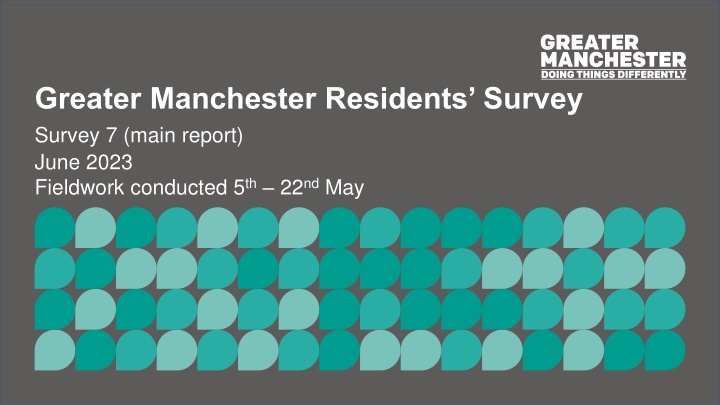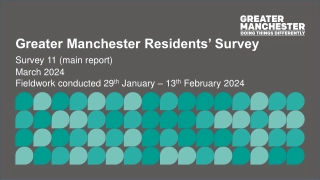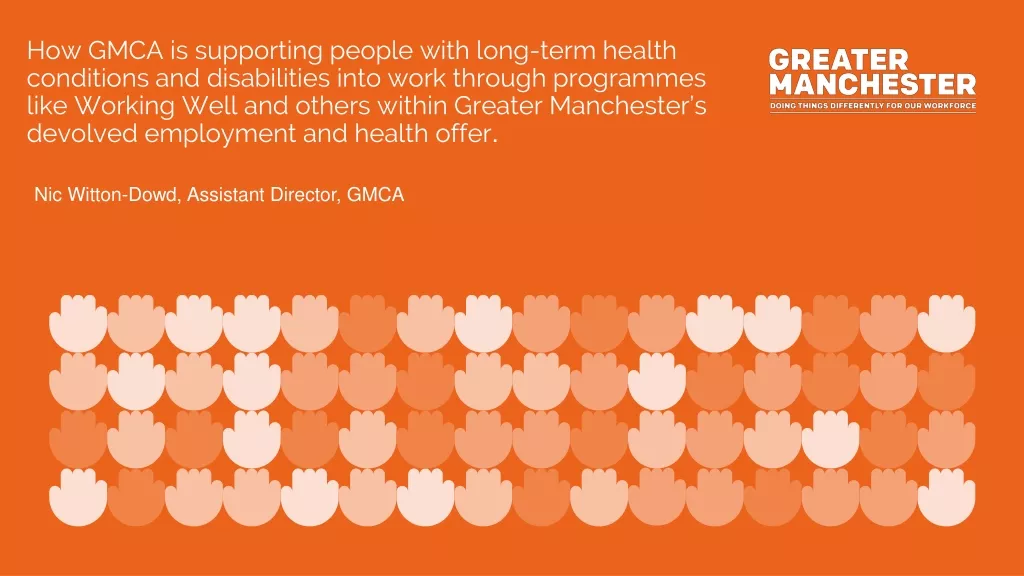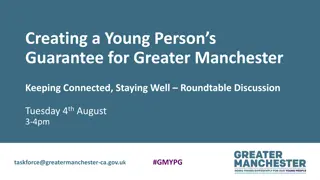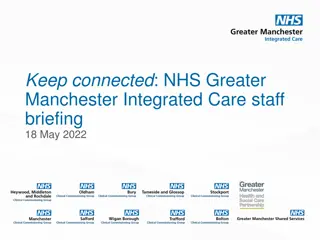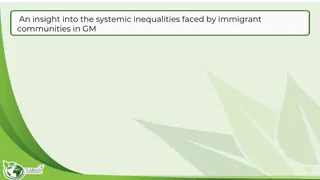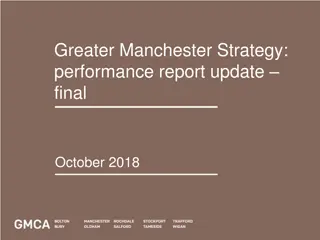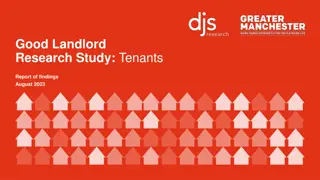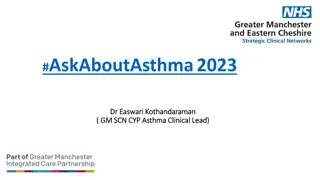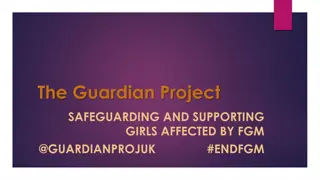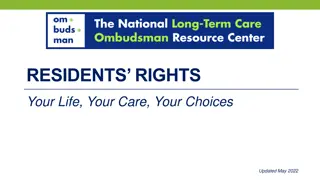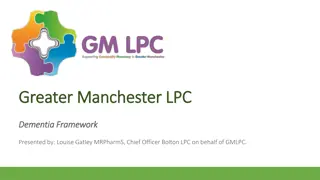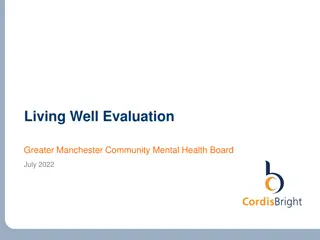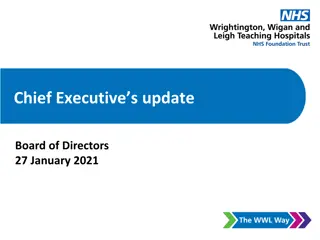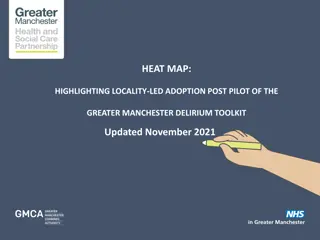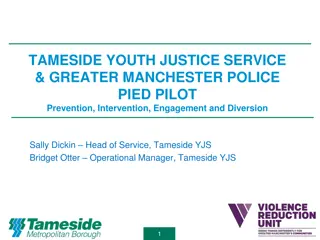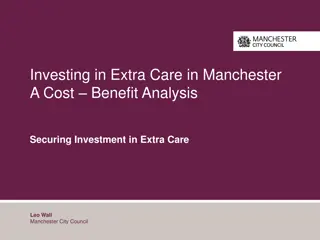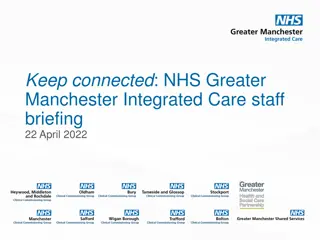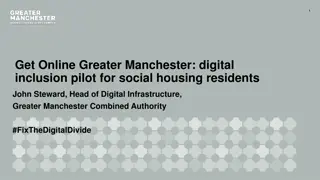Greater Manchester Residents Survey 2023 Summary Report
This report provides summary findings from a quantitative survey conducted between 5th and 22nd May 2023, with a sample of 1,488 residents across all ten Greater Manchester local authority areas. The survey covers various key topics such as health and wellbeing, cost of living, digital inclusion, and more. Results from this survey (survey 7) are compared to previous surveys conducted in 2022 and early 2023 to track trends and inform stakeholders on areas for support and improvement for Greater Manchester residents.
Uploaded on Oct 07, 2024 | 1 Views
Download Presentation

Please find below an Image/Link to download the presentation.
The content on the website is provided AS IS for your information and personal use only. It may not be sold, licensed, or shared on other websites without obtaining consent from the author.If you encounter any issues during the download, it is possible that the publisher has removed the file from their server.
You are allowed to download the files provided on this website for personal or commercial use, subject to the condition that they are used lawfully. All files are the property of their respective owners.
The content on the website is provided AS IS for your information and personal use only. It may not be sold, licensed, or shared on other websites without obtaining consent from the author.
E N D
Presentation Transcript
Greater Manchester Residents Survey Survey 7 (main report) June 2023 Fieldwork conducted 5th 22nd May
Report contents 3 Introduction 8 Health and wellbeing Cost of living (including food security) 22 48 Your local area 66 Digital inclusion 81 Locality summaries
Introduction and methodology Background Methodology Sample Report contents and guidance page 4 page 5 page 6 page 7 3
Background This report presents summary findings for a quantitative survey carried out between 5th and 22nd May 2023, with a representative sample of 1,488 residents from across all ten Greater Manchester local authority areas. Data from May 2023 (survey 7) is presented alongside that from similar Greater Manchester resident surveys undertaken in February 2022 (survey 1), April 2022 (survey 2), September 2022 (survey 3), November 2022 (survey 4), January 2023 (survey 5) and March 2023 (survey 6). These surveys build on the GMCA Covid-19 Tracker conducted between December 2020 and December 2021, by also looking at some key issues for the wider Greater Manchester Strategy and its vision for a fairer, greener and more prosperous city region. More information can be found on the next slide. To provide a national comparison, where available, Greater Manchester findings are presented alongside the most recent benchmarking data from relevant wider surveys (for example, the Office of National Statistics Opinions and Lifestyle Survey). In presenting Greater Manchester data, results from surveys 5, 6 and 7 have been merged where possible. This allows for larger and therefore more stable and robust sample sizes for analysis into specific sub-groups within the overall population over a six-month period. The following approaches have been used, as these felt most appropriate for the datasets in each theme: ensuring digital inclusion for all merged data for surveys 5+6+7 is used cost of living data from individual surveys is shown separately, along with merged results for surveys 5+6+7 These surveys will continue on a bi-monthly basis, initially until spring 2024. These regular ongoing insights are designed to give stakeholders information about where to target support, communications / engagement activities and resources to improve the lives of Greater Manchester residents. 4
Methodology Between February 2022 and May 2023, BMG Research has undertaken seven surveys, each comprising circa 1,500 residents from across Greater Manchester. Each intended sample included around 750 online panel respondents, 250 telephone respondents, and 500 online river sampled respondents (those who responded to adverts, offers and invitations to take part in the surveys).* The mix of using majority online sampling with a smaller telephone element was selected so that a representative and robust sample of Greater Manchester residents could be sourced. The telephone element was included so that those without internet access could take part in the survey. This was particularly important for the questions on digital inclusion. However, readers should be aware that insights based on the telephone-only data are less robust because of the smaller base size. Each survey is designed to take 15 minutes on average for respondents to complete; however, due to the emotive nature of the topics covered, interviews by telephone tend to take longer than this. Quotas are set to ensure the sample broadly reflects the profile of Greater Manchester s population by gender, age, ethnicity and disability, with further consideration for wider protected and key characteristics. Weights have been applied to the data gathered to ensure the sample matches the population profile by age, gender and locality, and to ensure consistency between individual surveys. * Drawing on learnings from surveys 1 and 2, BMG increased the number of invitations and revised their targeting for the river sampling approach in the last four surveys. This has proved effective, particularly in reaching potential respondents at off-peak times to capture the working population outside of core hours. 5
Sample Key demographics (before weighting applied) Sample information Survey 1 2 3 4 5 6 7 Survey 1 2 3 4 5 6 7 597 593 739 666 686 782 657 Male 9 Feb 2022 25 Mar 2022 1 Sep 2022 20 Oct 2022 7 Dec 2022 2 Mar 2023 5 May 2023 Fieldwork start 761 843 906 970 784 964 831 Female 25 Feb 2022 11 April 2022 24 Sep 2022 3 Nov 2022 21 Dec 2022 14 Mar 2023 22 May 2023 Fieldwork end 113 96 123 170 111 114 133 16-24 413 421 455 503 440 483 487 25-44 Mar 2022 Apr 2022 Sep 2022 Nov 2022 Jan 2023 Apr 2023 June 2023 Report publication 484 538 525 565 570 644 506 45-64 Total 1385 1467 1677 1636 1470 1767 1488 375 412 574 398 349 526 362 65+ respondents 762 (55%) 794 (54%) 785 (47%) 791 (48%) 721 (49%) 765 (43%) 789 (53%) Web 1201 1314 1503 1405 1297 1572 1278 White respondents Within racially minoritised communities 250 (18%) 250 (17%) 235 (14%) 270 (17%) 250 (17%) 250 (14%) 251 (17%) Phone respondents 166 137 159 208 173 181 194 373 (27%) 423 (29%) 657 (39%) 575 (35%) 499 (33%) 752 (43%) 448 (30%) River sampling 6
Report contents and guidance Report contents & guidance This survey 7 report presents a range of tables and charts with accompanying narrative to highlight the key findings from each section of the survey among the sample (1,488 respondents). These are sometimes presented alongside findings for surveys 1 (1,385 respondents), 2 (1,465 respondents), 3 (1,656 respondents), 4 (1,636 respondents), 5 (1,470 respondents) and 6 (1,767 respondents). Where relevant, differences in findings for specific demographic and other population characteristics compared to the Greater Manchester average are also reported. These differences are only highlighted where they are significantly different statistically (at the 95% level of confidence) compared with the total figures (i.e. the Greater Manchester average). On some questions, it should be noted that responses have been filtered only to include respondents to whom the question is relevant (e.g. those in work, or with children), and so bases are lower than the full sample of 1,488 respondents in some instances. Where the case, this has been noted in the footnotes of each slide, along with the unweighted base sizes. The initial section provides an overview into respondents personal health and wellbeing, followed by insights into costs of living, then satisfaction with their local area and digital access. Finally, and with regards to a key point of language, it should be noted that this report uses the term from within racially minoritised communities to refer to people and communities experiencing racial inequality (the term recognises that individuals have been minoritised through social processes rather than just existing as distinct minorities, although it is important to acknowledge the negative consequence of grouping all minoritised individuals together under one term, as there are significant differences both between and within these groups. From within has been added to recognise that not all in these communities will identify as minoritised). Due to limitations of sample size, we are generally unable to report survey findings for specific ethnic groups from a single survey wave. However, as more surveys have been conducted and we are now able to merge data from multiple surveys, the larger overall sample size allows us to look at smaller demographic groups in more detail. These differences, where currently possible, are included throughout this report. 7
Health and wellbeing Overview and context Health and wellbeing key findings Health and wellbeing summary Health and wellbeing detailed findings pages 9-10 page 11 pages 12-14 pages 15-21
Overview: Personal wellbeing
Wellbeing context This wave of the Greater Manchester Residents' Survey includes, for the second time, all four measures of personal wellbeing commonly asked in national surveys. Due to survey time constraints, previous waves had asked about two of these measures life satisfaction and levels of anxiety. Changes across the survey have allowed us to make capacity for exploring wellbeing in broader terms. In this wave, for the first time, we are also exploring adding a small number of further questions relating to broader health and wellbeing considerations linked to GM s shared prioritisation of joint work to help people, families and communities feel more confident in managing their own health. The wellbeing questions used in this survey are replicated from the ONS Annual Population Survey (APS). These are nationally recognised metrics of wellbeing, used in their current form since 2011. Because we are still in the early stages of reporting findings against all four questions, findings around happiness and feelings that things in life are worthwhile remain exploratory / indicative. Increasingly robust conclusions as we are already able to make around life satisfaction and anxiety will become available as we repeat these additional questions over subsequent surveys. Benchmarks to set the Greater Manchester figures in a wider Great Britain or United Kingdom context are difficult in this thematic area, but some details are included on latest UK-level published findings from the Annual Population Survey (July Sep 2022). A more detailed discussion of the complexities of these comparisons is included on slide 22. The main challenge with drawing clear conclusions from the benchmarking is that the national wellbeing data is drawn from surveys conducted face-to-face, which tend to produce somewhat different results to surveys conducted online or over the telephone.
Health and wellbeing key findings All wellbeing measures are broadly in line with the position reported in March, with no significant movement. WELLBEING 3 in 5 (60%) Greater Manchester respondents say they have high or very high life satisfaction 2 in 5 (41%) respondents said they were highly anxious, when asked how anxious they felt yesterday. A quarter (23%) said they were not feeling anxious at all Almost 3 in 5 (59%) said that they felt happy, when asked how happy they felt yesterday. Approaching 1 in 5 (17%) said that they felt unhappy Around 3 in 5 (62%) of respondents said they feel that the things they do in their life are worthwhile. Conversely, 14% say that the things they do in their life are not worthwhile MANAGING YOUR OWN HEALTH (newly introduced in this survey) 90% of respondents agree that they are involved in decisions about their own health 82% agree that they can look after their own health 78% agree that they know enough about their health 72% agree that they can get the right help if they need it while 10% disagree DISABLED RESIDENTS Disabled residents are significantly more likely than the population as a whole to report negative outcomes in all health and wellbeing considerations asked about - including low life satisfaction, high anxiety, feelings that things they do in life are worthwhile, happiness , being involved in decisions about themselves, able to look after their health, knowing enough about their health, and being able to get the right help if they need it
Summary: Satisfaction with life (1/2) How satisfied are you with your life nowadays? How anxious did you feel yesterday? 16% 17% 18% 18% 19% Very high (9-10) 20% High (6-10) 40% 41% 41% 42% 43% 43% 43% 46% 42% 43% 44% 43% High (7-8) Medium (4-5) 18% 17% 18% 18% 19% 19% 18% 18% 16% 18% Low (2-3) 17% 18% 24% 23% 23% 23% 21% 23% Medium (5-6) 24% 24% 24% 23% 21% Very low (0-1) 20% 16% 16% 16% 15% 15% 14% Low (0-4) Apr '22 (S2) Sept '22 (S3) Nov '22 (S4) Jan '23 (S5) Mar '23 (S6) May '23 (S7) Apr '22 (S2) Sept '22 (S3) Nov '22 (S4) Jan '23 (S5) Mar '23 (S6) May '23 (S7) A1/A2. Where 0 is not at all and 10 is completely Unweighted base: Greater Manchester Residents Survey 2, 1467, Survey 3, 1677; Survey 4, 1636; Survey 5, 1470, Survey 6, 1767; Survey 7, 1488 12
Summary: Satisfaction with life (2/2) To what extent are the things you do in your life worthwhile? How happy did you feel yesterday? Very high (9-10) Very high (9-10) 21% 23% 24% 26% 38% 39% High (7-8) 38% High (7-8) 39% 24% 22% 24% Medium (5-6) 21% Medium (5-6) 17% 17% 14% 13% Low (0-4) Low (0-4) March '23 (S6) May '23 (S7) March '23 (S6) May '23 (S7) Q10. Overall, to what extent do you feel that the things you do in your life are worthwhile, on a scale of 0 to 10, where 0 is not at all and 10 is completely ? / Q11. Overall, how happy did you feel yesterday, on a scale of 0 to 10, where 0 is not at all and 10 is completely ? Thresholds are applied to responses to convert the 11-point scale into the categories shown. Unweighted base: Greater Manchester Residents Survey 6, 1767, Survey 7, 1488 13
Summary: Managing your own health 9 in 10 respondents agree that they are involved in decisions about themselves, in regards to their health. A further 4 in 5 agree that they can look after their health (82%) and know enough about their health (78%). 72% agree that they can get the right help if they need it. 28% 29% 33% 52% 72% 78% 82% 90% agree 44% 49% 49% 38% 16% 15% 13% 10% 7% 7% 4% 2% I am involved in decisions about me I can look after my health I know enough about my health I can get the right help if I need it Strongly agree Agree Neutral Disagree Don't know S14. To what extent do you agree or disagree with the following statements? Unweighted base: All respondents Survey 7, 1488 (Valid responses) 14
Detailed findings: Health and Wellbeing
The proportion of respondents who say they have very high life satisfaction has remained in line with March (18% vs. 20%) and is statistically similar to 12 months ago. Those with lower life satisfaction continue to include disabled respondents and those in financially precarious situations. How satisfied are you with your life nowadays? % with low life satisfaction higher compared to S5-7 average (16%)*: Demographics: Disabled respondents (31%); including those who self-report mental ill health (42%), learning disability (33%), sensory disability (30%), mobility disability (30%) Those who have a physical or mental condition lasting longer than 12 months which reduces their ability to do things a lot (40%) Individual and/or family circumstance: Those not in work due to ill health or disability (45%) Those who are dissatisfied with the local area (34%) Those who would not recommend their local area (31%) Those who are not able to save money in the next 12 months (29%) Those who have had to borrow more money or use more credit in the last month (24%) Those who are renting (23%) 16% 17% 18% 18% 19% Very high (9-10) 20% 43% 46% 42% 43% 44% 43% High (7-8) 24% 23% 23% 23% 21% 23% Medium (5-6) 16% 16% 16% 15% 15% 14% Low (0-4) * Subgroup analysis uses merged data from S5-7 Apr '22 (S2) Sept '22 (S3) Nov '22 (S4) Dec '22 (S5) Mar '23 (S6) May '23 (S7) Significantly higher/lower than the Greater Manchester Residents Survey before 16 A1. Where 0 is not at all and 10 is completely Unweighted base: Greater Manchester Residents Survey 2, 1467, Survey 3, 1677; Survey 4, 1636; Survey 5, 1470; Survey 6, 1767, Survey 7, 1488
Over two fifths (41%) of respondents report feeling a high level of anxiety. This has stayed relatively consistent since survey 2 in April 2022. How anxious did you feel yesterday? % who felt highly anxious higher compared to GM average (41%) among)*: Demographics: Those who have a disability (56%), including those with mental ill health (70%), a learning disability (62%), a mobility disability (49%) or a sensory disability (57%) Those who identify as transgender (66%) Those who are not heterosexual (52%) Those who are Black or Black British (51%) Those aged between 18-34 (49%) Individual and/or family circumstance: Those who have low life satisfaction (63%) Those who are seeking help with the cost of living for the first time (53%) Those who have had to borrow more money or use more credit in the last month (53%) Those who are homemakers (51%) or not in work due to ill health or disability (57%) Those whose household income is up to 15,599 (51%) Those who are renting their home (48%) Those who have a pre-payment meter in their home (52%) High (6-10) 40% 41% 41% 42% 43% 43% 18% 17% Medium (4-5) 18% 18% 19% 19% 18% 18% 16% 18% Low (2-3) 17% 18% 24% 24% 24% 23% 21% 20% Very low (0-1) Apr '22 (S2) Sept '22 (S3) Nov '22 (S4) Dec '22 (S5) Mar '23 (S6) May '23 (S7) * Subgroup analysis uses merged data from S5-7 Significantly higher/lower than the Greater Manchester Residents Survey before 17 A2. Where 0 is not at all and 10 is completely Unweighted base: Greater Manchester Residents Survey 2, 1467, Survey 3, 1677; Survey 4, 1636; Survey 5, 1470; Survey 6, 1767, Survey 7, 1488
Around a quarter (24%) of respondents strongly feel that the things they do in their life are worthwhile; slightly fewer (21%) are very happy with their lives To what extent are the things you do in your life worthwhile? How happy did you feel yesterday? Very high (9-10) 21% 24% % who felt that things they do in their life are not at all worthwhile compared to GM average (14%): % who did not feel at all happy yesterday, compared to the GM average (17%): Demographics: Those who have a disability (25%), including those with mental ill health (38%), a mobility disability (23%) or a sensory disability (30%) Those who live in a 1 person 65+ household (33%) Individual and/or family circumstance: Those who earn up to 15,599 (20%) Demographics: Those who have a disability (29%), including those with mental ill health (42%), a mobility disability (27%) or a sensory disability (33%) Individual and/or family circumstance: Those who have high anxiety (28%) 38% 38% High (7-8) 24% 24% Medium (5-6) 17% 14% Low (0-4) May '23 (S7) May '23 (S7) Q10. Overall, to what extent do you feel that the things you do in your life are worthwhile, on a scale of 0 to 10, where 0 is not at all and 10 is completely ? / Q11. Overall, how happy did you feel yesterday, on a scale of 0 to 10, where 0 is not at all and 10 is completely ? Thresholds are applied to responses to convert the 11-point scale into the categories shown. Unweighted base: Greater Manchester Residents Survey 7, 1488 18
9 in 10 (90%) respondents agree that they are involved in decisions about themselves, in regards to their health. A further 4 in 5 agree that they can look after their health (82%) Managing your own health 28% 29% 33% 52% 72% 78% 82% Those with a disability and those not in work due to ill health/disability are less likely to agree with all aspects of personal health management 90% 44% 49% 49% 38% 16% 15% 13% 10% 7% 7% 4% 2% I am involved in decisions about me I can look after my health I know enough about my health I can get the right help if I need it Strongly agree Agree Neutral Disagree Don't know S14. To what extent do you agree or disagree with the following statements? Unweighted base: All respondents Survey 7, 1488 (Valid responses) 19
Based on respondents reflections in relation to managing their own health , a single Health Confidence Score can be derived The questions on health management included in this survey for the first time, have drawn on a methodology developed in academia to calculate an overall Health Confidence Score. This score is a summary measure of an individual s confidence in their capability, opportunity and motivation to participate in and look after his or her own health. This will be explored through the survey as a tool to inform discussions on this topic within the Greater Manchester area. Each aspect within the Health Confidence Score relates to a dimension of health management asked within the survey (slide 19 for details). Responses to these questions are assigned the following values on a 0-100 scale in order to produce a mean score. Access 64.0 I can get the right help if I need it Knowledge 66.8 I know enough about my health Self-management 70.4 I can look after my health Knowledge 80.6 I am involved in decisions about me Responses Values Overall health confidence score (out of 100) 70.4 Strongly agree 99.9 Agree 66.6 Neither agree nor disagree 33.3 Disagree 0 The overall Health Confidence Score is the average of the four individual mean scores for each dimension. in Greater Manchester S14. To what extent do you agree or disagree with the following statements? Unweighted base: All respondents Survey 7, 1488 (Valid responses) 20
Wellbeing comparisons with ONS data The metrics used in this survey are replicated from the ONS Annual Population Survey (APS). These are nationally recognised metrics of wellbeing, used in their current form since 2011. While these provide an ideal template for the GMCA to base their own wellbeing metrics on, the differences in approach between the APS and this residents survey make comparisons between the two something that should be approached with extreme caution. The APS is conducted using a combination of face-to-face and telephone interviewing, while the Residents Survey is conducted using a primarily online methodology with a small portion of telephone interviews. Sensitive questions such as these are shown to elicit significantly different responses between modes with the presence of an interviewer in person or on the phone increasing the proportion providing a positive response. This can be demonstrated by comparing responses between telephone and online responses within survey 7 of this Residents Survey: Metric (scale answers included out of 10) Online Telephone % who are satisfied (9-10/10) 19% 19% % who are happy (7-10/10) 58% 64% % who are not anxious(0-1/10) 22% 36% % who do things that make their life worthwhile (7-10/10) 61% 75% Given this, the comparisons provided below cannot be said to show that those in Greater Manchester are less likely to be satisfied, happy, not anxious, or see their life as worthwhile: Metric (scale answers included out of 10) ONS UK quarterly estimates (Oct-Dec 22)* GM Residents Survey (May 23) % who are satisfied (9-10/10) 18% 23% % who are happy (7-10/10) 59% 74% % who are not anxious(0-1/10) 23% 34% % who do things that make their life worthwhile (7-10/10) 62% 83% *Comparison with the ONS most recently non-seasonally adjusted quarterly estimates of personal well-being in the UK: April 2011 to December 2022, (October 2022 December 2022, published 12 May 2023). These personal well-being estimates are produced using the Annual Population Survey (APS), a household survey of people in the UK. It covers those resident at private addresses, and well-being questions are only asked of persons aged 16 years and over who gave a personal interview.
Cost of living and food security Overview and context Cost of Living key findings Cost of Living summary Food Security summary Detailed findings page 24 pages 25-26 page 27 page 31 pages 32-47
Overview: Cost of living and food security
Cost of living and food security context and approach This report presents summary findings for surveys 5, 6 and 7 of the research study of a representative sample of the Greater Manchester population. The information within this section provides the findings on the surveys cost of living questions. Cost of living has been a central theme in the Greater Manchester Residents' Surveys since September 2022 (and has therefore now been covered across five waves). Food security has been included in seven surveys since February 2022. While remaining a vital consideration, food security questions have been reduced this wave, to provide space for focus on other exploratory areas. As questions on cost of living have been asked across multiple surveys, we have tracked data over time. We have also merged data where possible, meaning that the sample is larger and more robust and greater analysis of sub-groups is possible. Questions within this section use a merged sample from the results from surveys 5, 6 and 7. The focus of this research is to provide a growing base of evidence, one which can serve as a way to highlight potential trends and indicators which individual localities can explore in greater detail. As this evidence base grows across multiple surveys we are able to provide greater depth on which groups are likely to be more affected by the issues explored, highlighting those where more investigation and potentially actions in response would prove useful. Where possible, data in the cost of living section of this report has been compared against the latest survey results from the ONS Opinions and Lifestyle Survey in Great Britain. Fieldwork for this survey in Great Britain is completed fortnightly and so comparisons of the GM survey (fieldwork 5 22 March 2023) have been compared to the ONS results from fieldwork conducted between 4 14 May 2023. ONS uses a mixed methodology, both online and telephone interviews. Please note that some questions in this section have had their wording or answers options adjusted to reflect changes to the ONS Opinions and Lifestyle Survey and comparisons with survey 3 and 4 findings may therefore not always be possible.
Cost of Living key findings CONCERNS AROUND COST OF LIVING 2 in 3 (69%) respondents are worried about the rising cost of living, though this has fallen significantly since March (72%) Whilst the majority of the GM population - three quarters (73%) - say their cost of living has increased over the past month, this has fallen slightly since March (75%). The same trend is noted across GB as a whole (67% in May vs 71% in March) The most common reasons for increases in respondents costs of living includes are rises in the price of food, with 89% of those experiencing higher living costs seeing their food costs increase. 74% of these respondents have also seen an increase in their energy bills FINANCIAL SITUATION AND BORROWING Whilst the proportion of GM respondents who say they will be able to save money in the next year has increased since March (43% cf. 40% in March), this figure is still lower than the GB average (39%) May 2023 findings around borrowing show stability compared to March, with just over a third of respondents having borrowed more in the past month than was the case last year (34% cf. 34% in March). 70% of those who have borrowed more or used more credit are experiencing at least some difficulty with their current level of debt as a result. Only four in ten (40%) of those who say they are experiencing difficulties with their level of debt have sought help from family, friends, public services or the VCSE sector. More respondents are worried about being able to pay someone back in May than March (53% cf. 47%) and being able to pay back the interest of their loan (54% cf. 44%)
Cost of Living key findings (continued) CONCERNS AROUND ENERGY COSTS Over half of the GM population (55%) say they find it difficult to afford their energy costs. Whilst this figure is significantly higher than the GB average (46%), it is in line with previous Greater Manchester surveys (55% in March) 1 in 4 (23%) respondents in Greater Manchester has a pre-payment meter, with 37% of these saying keeping it connected and topped up is a daily concern. 15% say they have deliberately disconnected in order to save the remaining credit for later use, significantly higher than in March (7%). Despite this, only a minority of respondents on a PPM have been in contact with their supplier in relation to advice / support. CONCERNS AROUND RENT AND MORTGAGE PAYMENTS A significantly higher proportion of respondents have seen an increase in their rent or mortgage payments compared to March data (31% of those experiencing higher living costs, vs 24% in March). This translates into a further increase in the proportion of GM respondents struggling to afford their mortgage (38% vs 35% in March) or their rent (55% vs 53% in March) The data for Great Britain also shows an increase since March. However, respondents in Greater Manchester are finding it significantly more difficult than the GB average to afford their mortgage payments (38% cf. 31% in GB) and their rent (55% cf. 49%) Renters are also more likely to be behind on their rent payments in Greater Manchester (14%) than across Great Britain (6%). Those with a mortgage are also more likely to be behind on their payments in GM (7% cf. less than 1% in GB) FOOD SECURITY There has been a significant increase in respondents often experiencing aspects of food insecurity 15% said it was often true the food they bought didn t last ,and that they didn t have money to get more (compared to 12% in March)
Summary: Cost of living Understandably, increases in food, energy and rent/mortgage costs are driving the rise in living costs over the last month The majority of Greater Manchester respondents continue to worry about the rising cost of living, and are likely to worry as they were in March* 89% say the price of their food shop has increased and74%say the price of their energy has gone up too Figures in brackets show change since Mar (S6) Very worried 31% are saying the price of their rent or mortgage costs have increased a significant rise since March, where only 24% said this had increased Greater Manchester 27% 41% 31% Somewhat worried (-3pp) (-1pp) (+4pp) 12% of parents are saying the price of their childcare costs or other costs have also increased, rising to 16% in parents of under 5s 89% Low life satisfaction 89% Low happiness 88% Low life is worthwhile 69% total 78% High anxiety Three quarters say their cost of living has increased over the past month As a response to rising costs 61% Are spending less on non-essentials (66%) My cost of living has increased Figures in brackets from GB benchmarking 54% Are using less fuel in their home (49%) Greater Manchester 73% 25% 49% Are shopping around more (49%) My cost of living has stayed the same My cost of living has decreased (-2pp) (+1pp) 47% (44%) GB Are spending less on food shopping / essentials 67% 30% benchmark 36% Are cutting back on non-essential journeys in their own vehicle (33%) (-4pp) (+3pp) All data is from May (S7). ONS data was published on 19th May 2023. Unweighted base: 1488 (All respondents); 1108 (All who have had their cost of living increase) *Not asked in the ONS survey 27
Summary: Household costs Over half of renters say it is difficult to afford their rent, while over a third of mortgage holders in Greater Manchester say it is difficult to afford the cost. These figures have risen again slightly since March (35% and 53%) 8% (+1pp) 11% (-4pp) 16% (-1pp) 17% (-4pp) 28% (+5pp) 28% (+1pp) 39% (-4pp) 42% (+/-0pp) 39% (+10pp) 40% (+2pp) 49% 55% 26% (+5pp) 31% 29% (+1pp) 38% 10% (-1pp) 5% (+/-0pp) 15% (+/-0pp) 9% (+2pp) 15% (-4pp) 14% (+4pp) 6% 3% (+1pp) (+1pp) Greater Manchester - Mortgage holders GB Benchmarking - Mortgage holders Greater Manchester - Renters GB Benchmarking - Renters Very easy Somewhat easy Somewhat difficult Very difficult Don't know / Prefer not to say Figures in brackets show change since March (S6) CL9. How easy or difficult is it to afford the following? Data on energy costs is from Survey 7. ONS data was published on 19th May 2023. Unweighted base: 1,488 (All respondents); 395 (Home owners who pay mortgage); 388 (Renters) 28
Summary: Borrowing money A third (34%) of Greater Manchester respondents have had to borrow more money in the past month than they did at the same time last year, which remains significantly higher than across Great Britain as a whole 23% (+/-0pp) Yes 34% (+/-0pp) No 72% (-1pp) 61% (+/-0pp) Don't know 5% 2% Greater Manchester GB Benchmarking Significantly higher/lower than GB average Figures in brackets show change since March (S6) CL3. Have you had to borrow more money or use more credit than usual in the last month, compared to a year ago? All data is from Survey 7. ONS data was published on 19th May 2023. Unweighted base: 1,488 (All respondents) 29
Summary: Debt (amongst respondents who are borrowing more compared to a year ago) Over half (53%) are worried about being able to pay a loan back, a rise from 47% in March 7 in 10 (70%) say they are experiencing some difficulty managing their current level of debt 2 in 5 (40%) are not seeking support with their debt. A third (33%) of those struggling have sought help from their friends and family 8% 14% (-9pp) Friends and family 33% Online debt advice services 15% 20% 18% (+5pp) My gas/electricity provider 15% 12% (-1pp) Citizens Advice 14% StepChange (debt charity) 8% 46% Local council - welfare advice 8% 28% (+1pp) 70% difficulty A credit union in my local area 8% 53% worried Local council - money advice 7% 57% 19% 25% (+5pp) My housing provider 5% have sought help from any of these organisations Turn2Us (national charity) 4% 5% (+/-0pp) 4% 2% Another voluntary/ community 4% Which of the following statements best describes your situation in relation to your current level of debt? No debt Can easily manage Getting harder Difficult to manage Unable to manage Don't know / Prefer not to say How worried are you about being able to pay a loan back? Christians Against Poverty (a 2% Not worried at all Not that worried Neither worried nor not worried Somewhat worried Very worried Don't know / Prefer not to say None of the above 40% DK / PNTS 3% CL3E. Which of the following statements best describes your situation in relation to your current level of debt? CL23. Have you tried to seek help with your debt through any of the following options? CL3C. How worried are you about any of the following? Unweighted base: 484 (All who have borrowed money/used more credit); 342 (All who are having difficulty managing their debt) 30
Summary: Food security Since March, those experiencing some aspects of food insecurity experienced often have increased significantly In the past twelve months have you ? found the food you bought didn t last and you didn t have money to get more worried whether your food would run out before you got money to buy more been unable to afford to eat balanced meals 11% 12% 12% 12% 13% 13% 14% 14% 15% 15% 15% 15% 15% 16% 17% 22% 23% 23% 24% 28% 27% 25% 25% 23% 28% 25% 26% 24% 29% 28% 61% 63% 59% 58% 58% 56% 56% 56% 56% 55% 54% 56% 54% 51% 51% Sept (S3) Oct (S4) Jan (S5) March (S6) May (S7) Sept (S3) Oct (S4) Jan (S5) March (S6) May (S7) Sept (S3) Oct (S4) Jan (S5) March (S6) May (S7) Significantly higher/lower than the previous survey Often true Sometimes true Never B2. How true would you say the following statements are when applied to your household for the last 12 months? Unweighted base: 1,442 (S3); 1,366 (S4); 1,220 (S5); 1,517 (S6); 1,235 (S7) 31
Detailed findings: Cost of living
7 in 10 (69%) respondents in Greater Manchester are worried about the rising costs of living, with 1 in 4 (27%) very worried the latter being significantly higher than the most recent ONS benchmark. % who are significantly more likely to feel very / somewhat worried compared to S5-S7 GM average (71%)* Worried about rising costs of living Demographics: Indian respondents (89%); Pakistani respondents (82%) Those with children not in early years (86%) Those with mental ill health (84%) Individual and/or family circumstance: Those struggling with their level of debt (94%) Those finding it difficult to afford their rent or mortgage payments (90%); or their energy costs (87%) Though with low happiness levels (89%) Those unable to save money in the next year (88%) Those with low life satisfaction (88%) Those not in work due to ill health or disability (87%) Those who do not feel their life is worthwhile (87%) Those seeking help with debt for the first time (86%) Those unable to look after their own health (85%); or do not know enough about their own health (84%) Those considering switching to a pre-payment meter (85%) Home makers (84%) Very worried 27% 29% 30% Somewhat worried 69% 72% 71% Neither worried nor not worried 41% 42% 42% Not that worried Not at all worried 11% 12% 12% 12% 11% 10% Don't know / Prefer not to say 6% 5% 6% GM December (S5) GM March (S6) GM May (S7) Significantly higher/lower than the previous survey * Subgroup analysis uses merged data from S5-7 CL4. In the past two weeks, how worried or not have you been about rising costs of living? Unweighted base: Survey 3, 1677; Survey 4, 1636; Survey 5, 1470; Survey 6, 1767; Survey 7, 1488 (All respondents) 33
There is a significant crossover between those who are worried about the rising costs of living and their personal wellbeing In-depth analysis amongst those worried about the rising costs of living Very worried 27% 40% Somewhat worried 49% 55% 58% 69% Neither worried nor not worried 78% 88% 89% 89% 41% Not that worried 39% Not at all worried 39% 34% 32% 11% Don't know / Prefer not to say 9% 12% 3% 5% 4% 9% 5% 6% 3% 4% 2% 1% 2% 2% Low life satisfaction (0-4) (n=254) Low happiness (0-4) (n=262) Low 'Life is worthwhile' (0-4) (n=206) High anxiety (6-10) (n=599) GM May (S7) CL4. In the past two weeks, how worried or not have you been about rising costs of living? Unweighted base: Survey 7, 1488 (All respondents) 34
3 in 4 (73%) respondents say their cost of living has increased in the last month, significantly more than the GB average (67%). Whilst the GM figure is higher than the GB average, these both have fallen since March. GM respondents are more likely than the GB average to say that increases are due to higher rent or mortgage costs (31% vs. 27%), though both figures have risen since March Change in cost of living over the last month Reasons for increase in cost of living (n=1,110) 86% 91% 89% 96% The price of my food shop has increased My cost of living has increased 83% 78% 74% 74% GM December (S5) 80% 18% My energy (gas or electricity) bills have increased 51% 45% 40% 38% The price of my fuel has increased GM March (S6) 75% 24% 16% The price of home broadband or mobile data plans has increased (not asked in ONS survey) My cost of living has stayed the same 40% 42% 21% 24% 27% GM May (S7) 73% 25% My rent or mortgage costs have increased 31% 13% 14% 14% 17% The price of my public transport has increased My cost of living has decreased GB benchmark 67% 30% The price of my childcare or other care costs have increased 6% 6% 7% GM Dec (S5) GM Mar (S6) GM May (S7) GB Benchmarking 3% 4% 8% 9% Significantly higher/lower than the GB Benchmark CL5. Has your cost of living changed compared to one month ago? CL6. Over the last month, in which ways has your cost of living increased? Base: S5, 1470; S6, 1767; S7, 1488 (All respondents); S5, 1203; S6, 1385, S7, 1110 (All whose cost of living has increased). ONS data, based on national fieldwork 4 14 May 2023 35
Respondents in Greater Manchester are more likely than the ONS GB average to be using less energy in their home (54% vs 49%), making energy efficient improvements (32% vs 22%), using their savings (32% vs 28%), using more credit (19% vs 15%) and using support from charities (6% vs 3%), as a result of the rising cost of living Actions taken due to rise in cost of living* 29% 29% 66% Walking more to save money 61% Spending less on non-essentials 65% Checking that I am benefiting from all the financial support 49% 20% 18% 54% Using less fuel such as gas or electricity in my home 59% Cutting back on non-essential journeys on public transport 49% 24% 24% 49% 51% Shopping around more Cutting back on home broadband or mobile data plans 44% 17% 16% 47% 46% Spending less on food shopping and essentials Looking for safe, warm and free places in my local community 33% 7% 6% Cutting back on non-essential journeys in my own vehicle 36% 37% 22% 7% 7% Cycling more to save money 32% 34% Making energy efficiency improvements to my home 28% Asked only in the Residents Tracker 32% 33% Using my savings GB Benchmarking GM May (S7) GM March (S6) GM December (S5) 15% Using credit more than usual, for example, loans or overdrafts 19% 20% 3% 6% 6% Using support from charities, including food banks Significantly higher/lower than the GB Benchmark CL7. Which of these, if any, are you doing because of the increases in the cost of living? Unweighted base: Survey 4, 1636; Survey 5, 1470; Survey 6, 1767; Survey 7, 1488 (All respondents). ONS data, based on national fieldwork 4 14 May 2023 36
Significantly more respondents say they will be able to save money over the next 12 months (43%) than the GB average (39%). Greater Manchester respondents are less likely than the GB average to be able to afford an unexpected expense of 850 (42% vs. 29% unable to afford) Will you be able to save money over the next 12 months? Can you afford an unexpected but necessary expense of 850? 39% 40% 41% 43% 48% 49% 53% 59% Yes Yes 39% 44% 41% 41% No No 40% 42% 39% 29% Don't know Don't know 23% 17% 16% 16% 13% 11% 10% 8% GM Dec (S5) GM March (S6) GM May (S7) GB Benchmarking GM Dec (S5) GM March (S6) GM May (S7) GB Benchmarking Significantly higher/lower than the GB Benchmark CL1. In view of the general economic situation, do you think you will be able to save any money in the next 12 months? CL2. Could your household afford to pay an unexpected, but necessary, expense of 850? Unweighted base: Survey 5, 1470; Survey 6, 1767; Survey 7, 1488 (All respondents). ONS data, based on national fieldwork 4 14 May 2023 37
Compared with the GB average, GM respondents are more likely to have borrowed more money in the past month compared to the same time last year (34% vs. 23%). Of these, 7 in 10 (70%) say they re experiencing some difficulty managing their current level of debt Have you borrowed more or used more credit in the last month than compared to a year ago? Which of the following statements best describes your situation in relation to your current level of debt? 8% 23% 20% 30% 34% 34% 46% Yes 70% difficulty No 72% 65% 61% 61% Don't know 19% 5% 2% 5% 5% 3% 2% No debt Can easily manage GM Dec (S5) GM March (S6) GM May (S7) GB Benchmarking Getting harder Difficult to manage Unable to manage Don't know / Prefer not to say Significantly higher/lower than the GB Benchmark CL3. Have you had to borrow more money or use more credit than usual in the last month, compared to a year ago? CL3E. Which of the following statements best describes your situation in relation to your current level of debt? Unweighted base: Survey 5, 1470; Survey 6, 1767; Survey 7, 1488 (All respondents); 484 (All who have borrowed more money / used more credit). ONS data, based on national fieldwork 4 14 May 2023 38
Those with mental ill health and those with long-lasting health conditions / illnesses are more likely to have borrowed more or used more credit or to be struggling with their debt levels Those who have borrowed more money or used more credit than usual in the last month, compared to the S5-7 GM average (33%) Those struggling to manage their debt levels compared to the GM average (24%) Demographics: Those with mental ill health (42%) Those with a condition that reduces their ability to do activities by a lot (37%) Demographics: Disabled respondents (44%); including those with a learning disability (62%); mental ill health (55%) Those who identify as trans (58%) Parents of children under 5 (51%) Those with a condition that reduces their ability to do activities by a lot (48%) Individual and/or family circumstance: Those renting (34%); including those renting from a housing association or trust (46%) Those with low levels of happiness (46%) Those with low levels of life satisfaction (45%) Those who do not feel like life is worthwhile (44%) Those who are seeking help with their debt (43%) Those who would not recommend their local area (32%) Those living in Bolton (40%) Those who have lived in the local area for 6-10 years (33%) or Those finding it difficult to afford their rent or mortgage payments (33%) Those unable to save money in the next year (31%) Those finding it difficult to afford their energy costs (31%) Those with high levels of anxiety (30%) Those worried about the rising costs of living (29%) Individual and/or family circumstance: Those struggling with their current levels of debt (100%) Those seeking help for the first time with their debt (100%) Those who were moved onto a pre-payment meter in the last year (54%); those who have opted to switch to a pre-payment meter in the last year (53%); those with a pre-payment meter (51%) Those finding it difficult to afford their rent or mortgage payments (54%) Those seeking help for the first time with the rising cost of living (54%) Those with low levels of life satisfaction (51%), and low feelings that life is worthwhile (48%) Those renting from their local authority or council (50%) Those out of work for 6 months or less (49%) Those unable to save money in the next year (49%) Those earning up to 10,399 (48%) CL3. Have you had to borrow more money or use more credit than usual in the last month, compared to a year ago? CL3E. Which of the following statements best describes your situation in relation to your current level of debt? Unweighted base: Survey 7, 1488 (All respondents); 484 (All who have borrowed more money / used more credit) 39 *Groups with a base size below 50 are not included
Only four in ten (40%) of those who say they are experiencing difficulties with their level of debt have sought help from family, friends, public services or the VCSE sector Among those experiencing some difficulty, have you tried to seek help with your debt through any of the following options? Those more likely not to have not sought help with their debt using any of the options given compared to the GM average (40%) Friends and family 33% Online debt advice services 15% Those not on a prepayment meter, with no plans to switch (54%) Those not seeking help with the cost of living (56%) Those earning over 52,000 (58%) Those who own their property (52%), or it is being bought on a mortgage (53%) Those who have lived in their local area for more than 21 years (50%) My gas/electricity provider 15% Citizens Advice 14% StepChange (debt charity) 8% 57% have sought help from any of these organisations Local council - welfare advice service 8% Those who have sought help with their debt more than average compared to the GM average (57%) A credit union in my local area 8% Local council - money advice service 7% Parents of children under 5 (74%) Those who have lived in their local area for 6-10 years (73%) Renters (71%) Those with a disability (67%), including those with mental ill health (71%) Those earning up to 15,599 (70%) Those with a condition that reduces their ability to do activities by a lot (70%) (61%) Those within racially minoritized communities (68%) My housing provider 5% Turn2Us (national charity) 4% Another voluntary/ community org 4% Christians Against Poverty (a charity) 2% None of the above 40% Don't know / Prefer not to say 3% 40 CL23. Have you tried to seek help with your debt through any of the following options? Unweighted base: 342 (All who struggle with debt)
Over half (53%) of respondents who have borrowed more money or used more credit are worried about their ability to pay someone back. Over half (54%) are worried about their ability to pay the loan s interest or the terms of the loan being changed suddenly Extent of worry about the following Figures in brackets show change since Mar (S6) 12% (-15pp) 13% (-6pp) 14% (-7pp) 18% (-15pp) 15% (+/-0pp) 14% (-12pp) 18% (+5pp) 19% (+3pp) 13% (+3pp) 13% (+5pp) 12% (-1pp) 18% (+7pp) 27% (+5pp) 29% (+6pp) 28% 22% (+6pp) (-1pp) 27% (+7pp) 25% (+4pp) 25% (+5pp) 17% (+15pp) 7% (+/-0pp) (+/-0pp) 6% 6% (+1pp) (+1pp) 4% Being able to pay someone back Being able to pay the interest of the loan back 54% The terms of the loan being changed suddenly 41% (-3pp) Losing the relationship you have with the person you have a loan from 33% Sum: Somewhat / Very worried 53% (+6pp) (+1pp) (+10pp) Not at all worried Not that worried Neither worried nor not worried Somewhat worried Very worried Don t know/ Prefer not to say CL3C. How worried are you about any of the following? Unweighted base: 484 (All who have borrowed money or used more credit) 41
Over half (55%) say they have difficulty affording energy costs, significantly higher than the GB average (46%). Disabled respondents, those with first language other than English and those who are financially vulnerable are significantly more likely to find energy costs difficult. % who are significantly more likely to find it very/somewhat difficult to afford their energy costs compared to S5-7 (54%)* Ease of affording energy costs 10% 11% 11% 12% Demographics: Pakistani respondents (78%) Those with a condition that reduces their ability to do activities by a lot (74%) Those with a disability (70%); including a mobility disability (72%) Those with a first language other than English (71%) Individual and/or family circumstance: Those who find it difficult to afford rent or mortgage payments (91%) Those struggling with their current levels of debt (89%) Those seeking help for the first time with their debt (82%) Those not in work due to ill health or disability (81%) Those unable to save money in the next year (78%) Those with low levels of life satisfaction (78%) Those who do not know enough about their own health (77%) Those with low levels of happiness (76%) Those earning up to 10,399 (73%) Those renting from a housing association or trust (72%) Those dissatisfied with their local area (72%) Those who have had to borrow more money or used more credit in the past month (71%) * Subgroup analysis uses merged data from S5-7 30% 30% 32% 35% 36% 39% 35% 35% 55% 55% 46% 53% 18% 17% 18% 11% 6% 4% 4% 3% GM Dec (S5) GM March (S6) GM May (S7) GB Benchmarking Very easy Somewhat difficult Don't know / Prefer not to say Somewhat easy Very difficult Significantly higher/lower than the GB Benchmark CL9. How easy or difficult is it to afford the following? Unweighted base: Survey 5, 1424; Survey 6, 1674; Survey 7, 1426 (All respondents who pay their energy costs). ONS data, based on national fieldwork 4 14 May 2023 42
Almost 1 in 4 respondents reported being on a pre-payment meter (PPM) (23%). 4 in 5 (79%) of these report some associated difficulty with 2 in 5 (37%) saying keeping topped up and connected is a daily concern. Despite this, only a minority have been in contact with their supplier in relation to advice / support. Of those with a pre-payment meter, any of these happened in the past month? (n=304) Do you have a pre-payment meter? (PPM) Yes = 23% 46% Keeping my PPM topped up and connected is a major daily concern 5% 41% 16% 37% 32% There have been times when I could not afford to top-up my PPM 41% 37% 4% 16% 16% 14% I have the money to top up my PPM, but I am unable to get to my meter / a shop to 4% 4% 7% 7% I have deliberately disconnected to save the remaining credit for later use 15% I have contacted my supplier for advice and support with energy costs 12% 68% My supplier has contacted me to offer advice and support with energy costs 7% No = 72% 25% 25% None of these apply to me Yes, have had a PPM for more than 12 months Yes, I have opted to switch to a PPM in the last 12 months Yes, I was moved onto a PPM in the last 12 months No, but I am considering switching to a PPM No, and I have no plans to switch to a PPM Don t know/Prefer not to say 19% 1% 1% 2% GM Dec (S5) GM Mar (S6) GM May (S7) Prefer not to say Significantly higher/lower than the previous survey CL8. Do you have a prepayment meter (pay-as-you-go meter) in your current home? CL8A. Citizens Advice are reporting that across the UK many energy customers with a prepayment meter are having to go without pay-as-you-go power (known as self-disconnection). Thinking about your use of your pre-payment meter, please select whether any of the following have happened to you in the last month? Unweighted base: S5, 1470; S6, 1767; S7, 1488 (All respondents); S5, 311; S6, 294; S7, 304 (All with a pre-payment meter) 43
GM respondents are more likely than the GB average to find it difficult to afford their rent (55% vs. 49%) or mortgage payments (38% vs. 31%). Respondents across both GM and GB are finding it more difficult to afford their rent or mortgage Ease of affording rent or mortgage payments % who are significantly more likely to find it difficult to afford mortgage payments compared to the S5-7 average (35%): 8% (+1pp) 11% (-4pp) Those with a disability (49%), including mental ill health (65%) Those who find it difficult to afford their energy costs (61%) Those with low levels of life satisfaction (61%), feeling that life is worthwhile (61%) and happiness (57%) Those finding it harder to cope their current levels of debt (56%) Those unable to save money in the next year (55%) Those earning below the Real Living Wage (55%) Muslim respondents (53%) Those who are not native English speakers (53%) 16% (-1pp) 17% (-4pp) 28% (+5pp) 28% (+1pp) 39% (-4pp) 42% (+/-0pp) 39% (+10pp) 40% (+2pp) 49% % who are significantly more likely to find it difficult to afford rent compared to the S5-7 average (52%): 55% 26% (+5pp) 31% 29% (+1pp) 38% Those who find it difficult to afford their energy costs (72%) Those struggling with their current level of debt (71%) Parents of children in college (70%) Those with low levels of life satisfaction (69%) Those considering switching to a pre-payment meter (68%) Those seeking help for the first time with their levels of debt (68%) Black or Black British respondents (67%) Those dissatisfied with their local area (66%) Those in part-time employment (66%) 10% (-1pp) 5% (+/-0pp) 15% (+/-0pp) 9% (+2pp) 15% (-4pp) 14% (+4pp) 6% 3% (+1pp) (+1pp) Greater Manchester - Mortgage holders GB Benchmarking - Mortgage holders Greater Manchester - Renters GB Benchmarking - Renters (Results may be being impacted by a large difference between the proportion of respondents answering don t know ) Very easy Somewhat easy Somewhat difficult Very difficult Don't know / Prefer not to say Significantly higher/lower than the GB Benchmark Figures in brackets show change since Mar (S6) CL9. How easy or difficult is it to afford your... Base: 395 (Mortgage holders); 388, (Renters). ONS data, based on national fieldwork 4 14 May 2023 44
Renters are generally more likely to find it difficult to afford their rent, no matter the type of tenancy, than those with mortgage payments. However, across all tenures, respondents are finding it more difficult to afford their rent or mortgage payments compared to March. Ease of affording rent or mortgage payments 8% (-6pp) 10% (-6pp) 17% (-4pp) 17% (+2pp) 19% (-6pp) 18% (-5pp) 38% (+8pp) 42% (-1pp) 43% 42% 59% (-5pp) (+11pp) 60% 38% (+/-0pp) 50% 29% (+1pp) 38% 16% (+7pp) 18% (+/-0pp) (-3pp) 12% 9% (+2pp) (+1pp) (+8pp) 12% 5% (-7pp) 4% 3% (+1pp) Being bought on a mortgage Rented (Local Authority / Council) Rented (Housing Association / Trust) Rented (Private) Very easy Somewhat easy Somewhat difficult Very difficult Don't know / Prefer not to say Figures in brackets show change since Mar (S6) (Results may be being impacted by a large difference between the proportion of respondents answering don t know ) CL9. How easy or difficult is it to afford your... Base: 391 (Being bought on a mortgage); 112 (Rented (Local Authority / Council)); 104 (Rented (Housing Association/Trust)); 172 (Rented (Private)) 45
Significantly more GM renter and mortgage owner respondents say theyre behind on their rent and mortgage payments than the ONS GB average (14% vs 6% renters; 7% vs. <1% home owners) Are you behind on rent or mortgage payments? GM Renters - May (S7) 14% (-2pp) 80% (+3pp) 6% (+/-0pp) GB benchmarking - Renters 6% 84% 9% GM Owners - May (S7) 7% (+/-0pp) 92% 1% (-6pp) (+6pp) GB benchmarking - Owners 94% 6% Yes No Don't know Significantly higher/lower than the GB Benchmark Figures in brackets show change since Mar (S6) CL6A. Are you behind on your rent or mortgage payments? Unweighted base: 416 (All who have a mortgage payment); 433 (All who pay rent). ONS data, based on national fieldwork 4 14 May 2023 46
Those renting from their local authority or council (20%) and those renting from a housing association or trust (23%) are more likely to say they are behind on their rent than the Greater Manchester average (11%). Are you behind on rent or mortgage payments? Total 11% 86% 3% Being bought on a mortgage 7% 92% 1% Rented (Local Authority / Council) 73% 8% 20% Rented (Housing Association / Trust) 23% 68% 9% Rented (Private) 6% 92% 2% Yes No Don't know Significantly higher/lower than total CL6A. Are you behind on your rent or mortgage payments? Unweighted base: 849 (All who pay rent or mortgage payments); 411 (Being bought on a mortgage); 127 (Rented (Local Authority / Council)); 124 (Rented (Housing Association/Trust)); 182 (Rented (Private)) 47
Your local area Overview and context Your local area key findings Your local area summary Your local area detailed findings page 50 page 51 pages 52-56 page 57-65
Overview: Your local area
Your local area context The May 2023 Residents' Survey includes, for the second time, a number of questions designed to explore residents' experiences of their local area, along with their sense of community, local pride and belonging. In this wave, the survey consolidated our understanding and expanded into some new areas (e.g. transport links within Greater Manchester, and in relation to volunteering / involvement with community groups). The questions have been included to explore how this kind of data may be able to inform local monitoring and evaluation of pride in place and life chances interventions (including through the UK Shared Prosperity Fund to invest and empower local communities), as one part of a wider approach. Results should be considered exploratory, though we aim to grow the base of evidence over subsequent surveys. Initially, the results will highlight potential trends and indicators which individual localities can explore in greater detail. Over time, we will be able to provide greater depth on which groups are likely to be more affected by the issues explored, highlighting those where more investigation would prove useful. Benchmarks, where included, reflect October 2021-September 2022 England figures from the DCMS' Community Life Survey*. The DCMS survey is conducted through self-completion, either online or on a paper questionnaire. This is comparable with the Residents Survey, which is either self-conducted online or through a telephone interview. * Comparisons are from the October 2021-September 2022 England figures from the DCMS Community Life Survey 2021/22, full results online here. Wider details on the DCMS survey methodology are available here.
